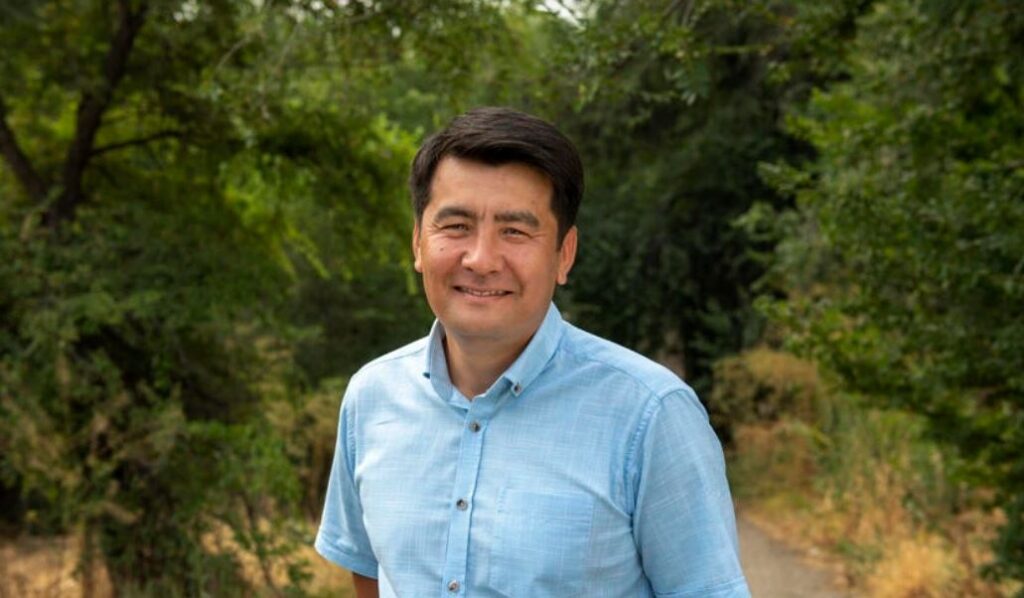The collapse of the Soviet Union and the subsequent emergence of 15 new countries transformed what was once considered internal migration, leaving an extraordinary number of people marooned across newly established borders. Many found themselves holding obsolete Soviet passports or lacking any documentation with which to verify their birthplace. Such was the scale of the problem that in its 2014 Special Report: Ending Statelessness Within 10 Years, the UN Refugee Agency (UNHCR) estimated that “more than two decades after the disintegration of the Soviet Union, over 600,000 people remain stateless.”
This was the case for Vladi, a forty-year-old man with a learning disability, bright blue eyes and a shock of blonde hair, who The Times of Central Asia spoke with at a truck stop in the hamlet of Darvaza in Turkmenistan’s Karakum Desert. When the Soviet Union dissolved in 1991, Vladi was with his father in Ashgabat. With non-ethnic Turkmen not feeling particularly welcome in the chaotic early days of independence, most Russians went home, but during their passage back to Kazan in Tatarstan, Vladi and his father became separated. With no passport, Vladi had become landless, an illegal alien unable to return home. Having drifted from village to village ever since, he’d been in Darvaza for eleven years, now, serving as little more than a whipping boy.
Whilst the number of those with expired or invalid papers is difficult to gauge, particularly badly affected are so-called “border brides” who’ve married across national frontiers and found themselves legal in neither country. For years now, though, Central Asia has sought to tackle the issue of statelessness head-on. Thus, for example, in 2020 Tajikistan adopted an amnesty law which granted official status to some 20,000 people. In the same year, a new provision in the law allowed 50,000 stateless people in Uzbekistan to acquire citizenship.
TCA spoke with Azizbek Ashurov, the Executive Director of Ferghana Valley Lawyers Without Borders, who in 2019 received the Nansen Refugee Award for his work, which saw the Kyrgyz Republic declared by the UNHCR and UNICEF to be the first country in the world to have eradicated the issue of statelessness.
TCA: How did you first become involved in the question of statelessness, and what brought the issue to your attention?
Ashurov: I was born during the days of the Soviet Union, when we all had a unified citizenship; the population was very mobile at that time. There were just administrative borders; there was no need to obtain any authorization documents in order to cross these. When the collapse of the USSR occurred in 1991, a lot of people were caught in another state, studying, working, temporarily residing, etc. So, when the 15 new states were formed, along with many other things, each state faced the question: out of the population on the territory at that moment, who should be recognized as our citizens?
All these things had to be linked to the legislation emerging in the states. Many adopted their constitutions two or three years after independence. Kyrgyzstan only adopted a constitution on May 5, 1993. The first law that defined who are citizens in the Kyrgyz Republic came into force on February 18, 1994. The approach was similar in all the states, but there was a deadline. The law said that at the time it came into force, those citizens of the former Soviet Union who permanently reside in the country and had a propiska (permit issued by the authorities that registers the bearer’s place of residence) automatically became citizens of Kyrgyzstan.
I was born in the Uzbek SSR, but our family came from Kyrgyzstan. My parents worked in Uzbekistan, and we were in this state when the Soviet Union collapsed. In the 90s, we moved from one country to another. And it so happened that we moved after the law on Kyrgyz citizenship came into force, but before the Uzbek law had come into force [1995]. Consequently, we found ourselves in a netherworld. In Uzbekistan, we weren’t recognized as citizens, so we came to Kyrgyzstan, but here the deadline had passed.
When new passports of the independent states started to be issued, people became concerned. That’s when I something was deeply wrong.
I finished school and studied to become a lawyer. When I started my first legal practice, unlike other lawyers, I paid attention to the issue of statelessness, probably because of my personal experiences. In 2003, we created a new organization called Lawyers of Fergana Valley, and I was one of its founders. When we were defining our remit, one of problems we included in the list of our services was assistance to stateless people and those who have problems with their legal status. Still, we didn’t understand the scale of this problem, and the state didn’t either. It’s very difficult to count how many people have this status, because most of them aren’t documented or registered. That’s why the authorities don’t have exact figures.
We were providing assistance, and we saw many people dealing with this issue, so we turned to the UNHCR, which had a mandate to reduce the number of stateless people. In 2008, we conducted a study which showed the problem was urgent. The law at that time didn’t allow people to legalize their status quickly and effectively, so we started working with the state to assist people, many of whom didn’t have access to the procedure for determining their citizenship. There were also difficulties in registering the birth of children to parents who were undocumented.
So, we promoted changes in the legislation, and the citizenship law of 2007 ended up being quite progressive. Then, in 2013, we made more changes which allowed a large group of people in difficult situations to apply for a simplified procedure for citizenship. In 2014, together with the state and the UNHCR, we launched a countrywide campaign to identify and document stateless people. After 14 years, our organization, together with the UNHCR and passport offices, created more than 60 mobile passport offices which included our lawyers. We traveled to all regions of the country, even remote ones. There were cases where we couldn’t reach people by car who had problems with their legal status, so we went on horseback. By 2019, we identified over 13,000 stateless people, all of whom eventually received documents.
In 2019, the UN recognized Kyrgyzstan as the first country to conduct a universal campaign and eliminate all known cases of statelessness at that time. In honor of this, our organization was awarded the Nansen Prize. We’re very proud of this award; it was a team effort. The first recipient of this award was Eleanor Roosevelt, and after us, Angela Merkel received this prize.
TCA: Do you believe that statelessness has now been completely eradicated in the Kyrgyz Republic?
Ashurov: The eradication of this legal problem, and I consider it a legal problem, has two components; one is addressing current cases, and secondly is preventing future cases. What we’ve been able to do is a big step in the first component. In 2019, we were able to help get citizenship for all the people we identified; but states have borders with other states – people come and go. People come to Kyrgyzstan and find themselves in this situation, and Kyrgyz citizens can also find themselves without citizenship – there are many reasons for this.
Now, we’re focusing our work on preventing future cases of statelessness. For example, the Uzbek law on citizenship has a provision that requires its citizens to register with consular offices if they leave their country. If they don’t register within five years for one reason or another, they lose their citizenship. Why does this happen? Well, Uzbekistan doesn’t have consulates in all countries, and this situation is also connected with migration issues. For example, a woman from Uzbekistan marries a Kyrgyz man and moves to a Kyrgyz village. Often, such people don’t know the migration rules and miss the deadline for registering. Thus, these people become illegal migrants. We call such people stateless persons with de facto status. That is, they don’t even have the official status of a stateless person. These are the kinds of laws that cause new cases of statelessness.
Previously, we also had a gap in the law wherein any citizen of Kyrgyzstan leaving the country with the intention of obtaining citizenship of another state could write an application to renounce their citizenship. There were examples with migrants who went to the Russian Federation, but some applications were refused there – no state gives a 100% guarantee. Upon returning home, such people found themselves in a difficult situation. Some were stopped at the border because their passport was canceled as they’d renounced their citizenship, and others found out after arriving home when applying for a new passport.
There are two UN international conventions on the status of stateless persons which stipulate that all countries should create such provisions to prevent new cases of people losing their citizenship. For example, when a person leaves one nationality, they must have another in place. Last year, with our partners from the UNHCR, we were able to achieve the adoption of this norm in Kyrgyzstan; now, Kyrgyz citizens can’t renounce their citizenship without presenting evidence that they have another.
TCA: According to the UN Refugee Agency, as of December 2021, 56,814 people were “known to be stateless across Central Asia [with] 38,000 of these are located in Uzbekistan, alone.” What can be done to end the problem of statelessness?
Ashurov: The UNHCR collate these figures based on information from government agencies, but at the same time they collect information from parallel sources which are closer to the real picture. As for Uzbekistan, most stateless people don’t have any official status; that is, the mechanisms for registration are very strict. For example, even to leave their country an Uzbek citizen must obtain an exit permit.
Now, though, Uzbekistan is showing a very positive dynamic in solving the issue. Five years ago, there were more than 100,000 people who didn’t have citizenship – then a change in the law was made which gave over 50,000 people access to naturalization procedures. These are people who’d previously missed the deadline and still had Soviet-era passports. Thanks to this, there are fewer and fewer stateless people there every day.
In Tajikistan, the authorities identified twice as many stateless people as in Kyrgyzstan. As a result, they adopted the necessary laws, and are now working on further legalization with regard to such people. In Kazakhstan, there was also a national campaign to eradicate this problem. There is positive momentum, and they created a procedure to identify stateless people.
In Kyrgyzstan, there isn’t a unified procedure. Stateless people don’t have a certificate which meets international standards, and such a document can’t be used to cross the border. Now, the authorities are working to ensure that stateless persons have digital and biometric documents which guarantee freedom of movement. Of course, they won’t fall under any interstate agreements on simplified entry, but they will be able to get visas for the countries they want to go to.
In addition, against the background of the war in Ukraine, a lot of migrants are returning from Russia with canceled Russian passports. Our citizens who obtained citizenship there and wanted to avoid mobilization – such measures were taken against them. We’re working to help these people restore their Kyrgyz citizenship.

Azizbek Ashurov; image: UNHCR











